One of the country’s best-loved comedians, Norman Wisdom was born into an impoverished family and, at an early age, was sent to live in Deal. Aged 14, he took a succession of jobs in London, later becoming one of the highest-paid British stars of his day. This pub, named after him, was previously the job centre. However, it was long-known for teas and hot dinners, having been Dobson’s, later Little’s, Café and Restaurant.
Text about The Sir Norman Wisdom.
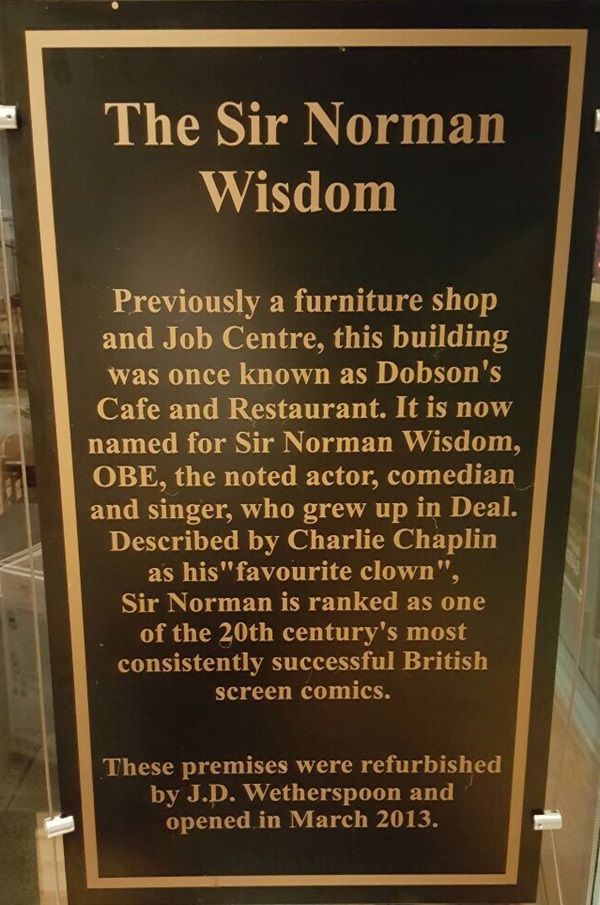
The text reads: Previously a furniture shop and Job Centre, this building was once known as Dobson’s Café and Restaurant. It is now named for Sir Norman Wisdom, OBE, the noted actor, comedian and singer who grew up in Deal. Described by Charlie Chaplin as his “favourite clown”, Sir Norman is ranked as one of the 20th century’s most consistently successful screen comics.
These premises were refurbished by J D Wetherspoon and opened in March 2013.
A print and text about The Sir Norman Wisdom.
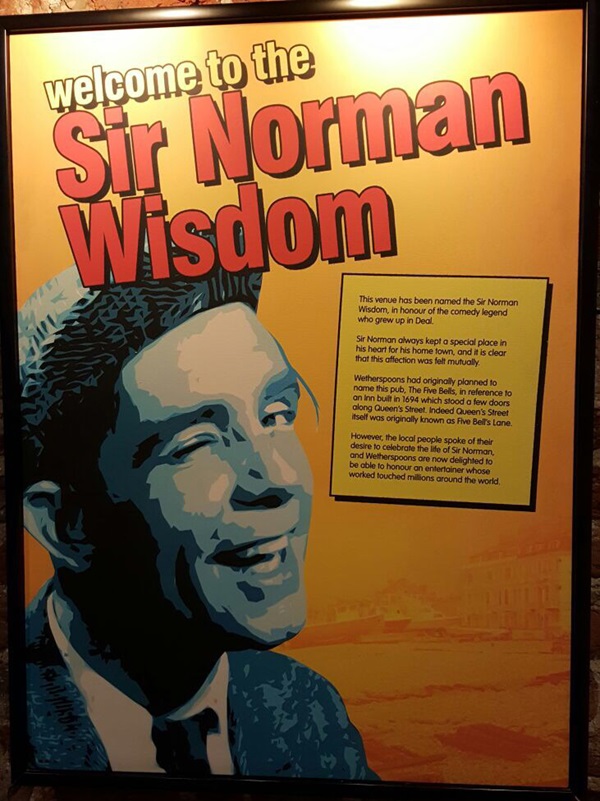
The text reads: This venue has been named The Sir Norman Wisdom, in honour of the comedy legend who grew up in Deal. Sir Norman always let a special place in his heart for his home town, and it is clear that this affection was felt mutually. Wetherspoons had originally planned to name this pub, The Five Bells, in reference to an inn built in 1694 which stood a few doors along Queen’s Street. Indeed Queen’s Street itself was originally known as Five Bell’s Lane. However the local people spoke of their desire to celebrate the life of Sir Norman, and Wetherspoons are now delighted to be able to honour an entertainer whose work touched millions around the world.
Text about the design philosophy for The Sir Norman Wisdom.
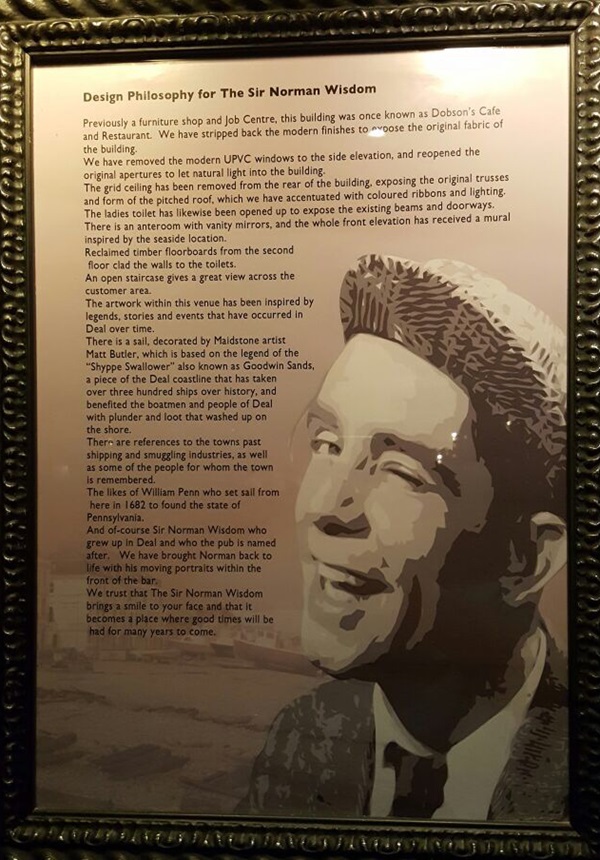
The text reads: Previously a furniture shop and Job Centre, this building was once known as Dobson’s Café and Restaurant. We have striped back the modern finishes to expose the original fabric of the building. We have removed the modern UPVC windows to the side elevation, and reopened the original apertures to let natural light into the building. The grid ceiling has been removed from the rear of the building, exposing the original trusses and form of the pitched roof, which we have accentuated with coloured ribbons and lighting. The ladies toilet has likewise been opened up to expose the existing beams and doorways. There is an anteroom with vanity mirrors and the whole front elevation has received a mural inspired by the seaside location. Reclaimed timber floorboards from the second floor clad the walls to the toilets. An open staircase gives a great view across the customer area. The artwork within this venue has been inspired by legends, stories and events that have occurred in Deal over time.
There is a sail, decorated by Maidstone artist Matt Butler, which is based on the legend of the Shyppe Swallower also known as Goodwin Sands, a piece of the Deal coastline that has taken over three hundred ships over history and benefited the boatmen and people of Deal with plunder and loot that washed up on the shore.
There are references to the towns past shipping and smuggling industries, as well as some of the people for whom the town is remembered. The likes of William Penn who set sail from here in 1682 to found the state of Pennsylvania. And of course Sir Norman Wisdom who grew up in Deal and who the pub is named after. We have brought Norman back to life with his moving portraits within the front of the bar. We trust that The Sir Norman Wisdom brings a smile to your face and that it becomes a place where good times will be had for many years to come.
An original drawing on glass entitled The Ship ‘Welcome’, by Flo Flozard.
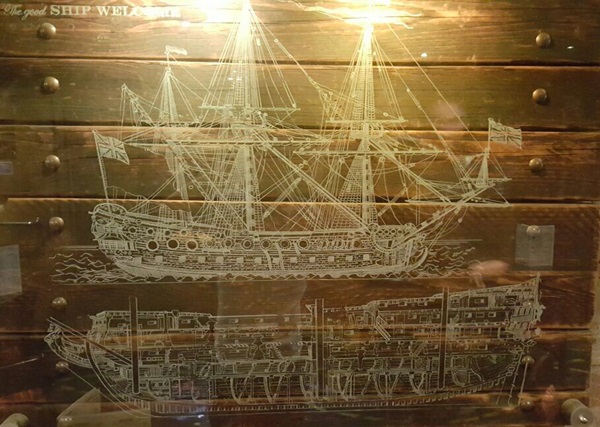
The text reads: The ship Welcome was the vessel that carried William Penn to America in 1682. This drawing of a galleon depicts what these ships looked like at the time. Welcome was a square rigged vessel, 300 tons, about 150 feet long, high in the bow, and even higher in the stern. The ship’s master was Robert Greenway. There were about 102 travelling passengers. The ship Welcome has been among twenty two vessels that crossed the Atlantic Ocean in order to carry the very first 2,000 settlers to the Pennsylvania Colony in the years 1681-82.
An original painting and collage entitled A Tribute to William Penn, by Flo Fozard.
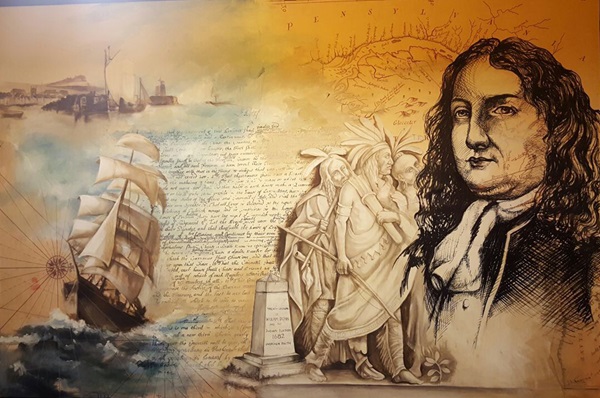
The text reads: William Penn was the first great hero of American liberty. During the late 17th century, when Protestants persecuted Catholics, Catholics persecuted Protestants and both persecuted Quakers and Jews, Penn established an American sanctuary which protected freedom of conscience.
Almost everywhere else, colonists stole land from the Indians, but Penn travelled unarmed among the Indians and negotiated peaceful purchases. He insisted that women deserved equal rights with men. He gave Pennsylvania a written constitution which limited the power of government, provided a humane penal code, and guaranteed many fundamental liberties. William Penn sailed from Deal, England, leaving 31 August 1682, and arrived at the mouth of the Delaware Bay, America on October 24, 1682.
A decorative panel using hemp rope, care of moor fast (marine) Kent, symbolic of Deal’s Marine Heritage.
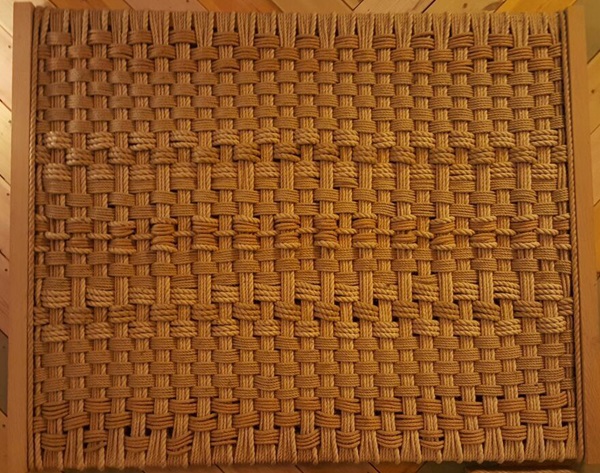
An acrylic painting entitled The Shyppe Swallower, by Matt Butler.
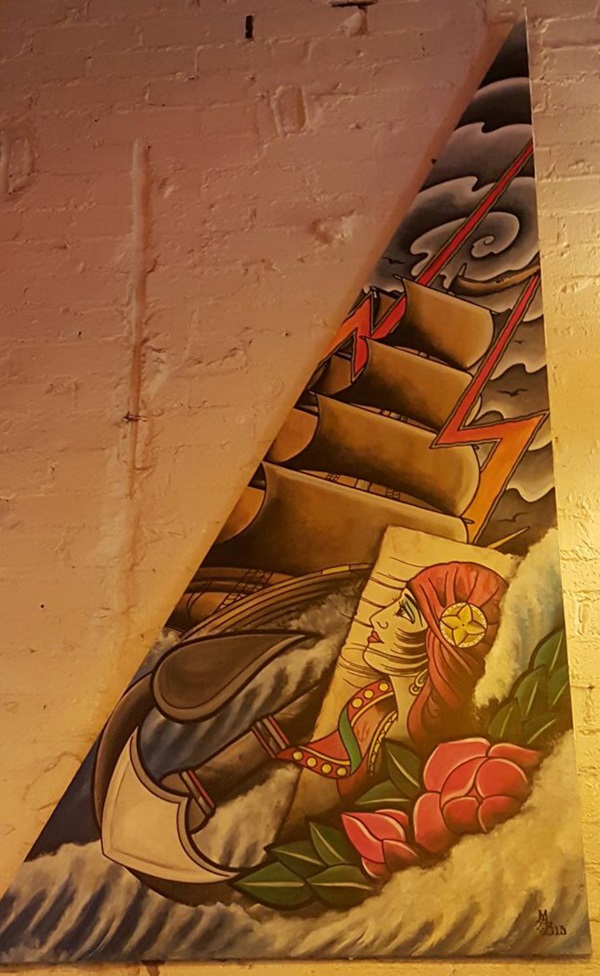
The original acrylic on canvas is based on the legend of the Shypee Swallower now known as the notorious Goodwin sands which has sadly taken over 300 ships down, but richly benefited the people and boatmen of Deal with shipwrecks, cargo, plunder and a safe haven for the many seeking refuge from a sailors grave.
A patriotic mirror on display which is a tribute to the Royal Marine School of music.
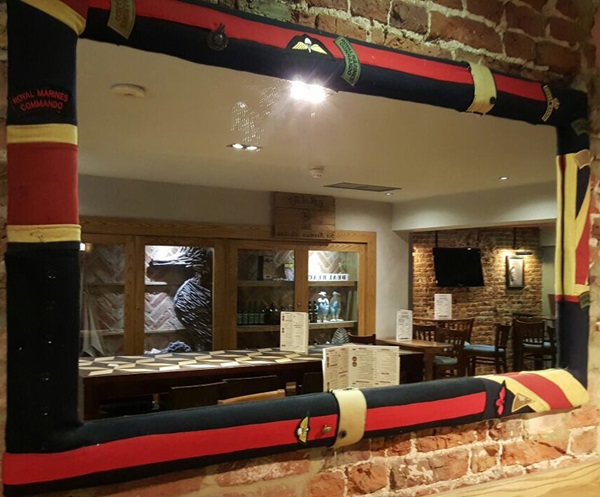
The patriotic mirror on display within this venue is a tribute to the Royal Marine School of music who used to be based at Deal Barracks but now reside at Portsmouth.
Deal has had a long association with the Military. Deal Castle was built by Henry VIII between 1539 and 1540 as an artillery fortress to counter the threat of invasion. It is one of the finest Tudor artillery castles in England.
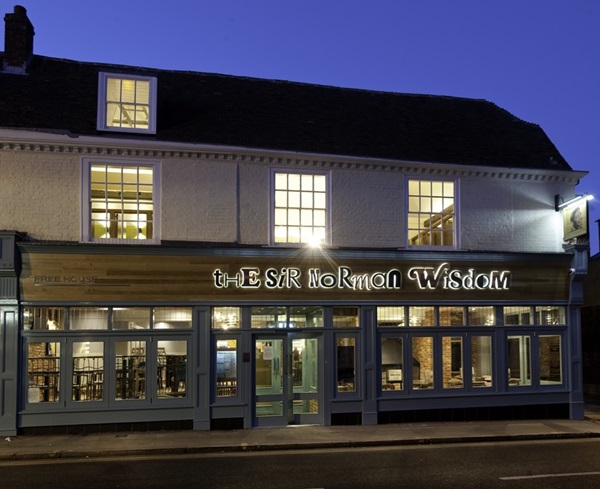
If you have information on the history of this pub, then we’d like you to share it with us. Please e-mail all information to: pubhistories@jdwetherspoon.co.uk